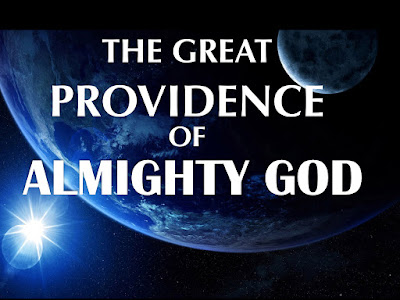
It was Zechariah's turn. Burning incense in the temple's sanctuary was something he must have done dozens of times. It was part of his priestly duties. And he had been a faithful servant of God for years and years. He and his wife Elizabeth had always been careful to obey all the Lord's commandments and regulations.
On this particular day, Zechariah was chosen by lot to be the one to burn the incense. Drawing lots for this duty was the custom of the priests. So you could say it was the luck of the draw for Zechariah to be entering into the inner sanctuary. Or was it?
I think it was God's plan and His providence. Zechariah and Elizabeth's son was to become John the Baptist, the forerunner of Jesus. And what's incredible is that Elizabeth had been barren her whole life, not to mention that she and her husband were old. Her pregnancy was miraculous.
While Zechariah was inside the sanctuary, God made the first move - a move that would shake Zechariah with overwhelming fear. While he was alone in the sanctuary, the angel Gabriel appeared to him, standing to the right of the incense altar. Now that would scare the living daylights out of anybody.
God sent Gabriel with a message - that Elizabeth would give birth to a boy, and they were to name him John (which in Hebrew means "Jehovah is gracious"). Considering the circumstances, God was certainly gracious to Zechariah and Elizabeth. He answered their prayer and gave them a child.
Gabriel proceeded to tell Zechariah all about how great his son John would be. One major problem. Zechariah doubted him. A no-no when talking to an angel sent by God. Because of his attitude, things sort of went downhill from there. Gabriel struck Zechariah mute!
Then the angel said, “I am Gabriel! I stand in the very presence of God. It was he who sent me to bring you this good news! But now, since you didn’t believe what I said, you will be silent and unable to speak until the child is born. For my words will certainly be fulfilled at the proper time.” (Luke 1:19-20)
Well, time went on, Zechariah became fairly proficient with communicating on a tablet. Nine months passed by, and a healthy baby boy was born. When he was 8 days old, the relatives gathered for the baby's circumcision ceremony. That was the time when a Jewish baby was officially named. The family members all thought the baby should be named Zechariah after his father. However, Zechariah no doubt remembered what the angel Gabriel told him. And this time, Zechariah pulled through with flying colors.
"So they used gestures to ask the baby’s father what he wanted to name him. He motioned for a writing tablet, and to everyone’s surprise he wrote, “His name is John.” Instantly Zechariah could speak again, and he began praising God." (Luke 1:62-64)
What happened next was to be one of the great prophecies of the Bible. With exciting anticipation, Zechariah went on a wonderful rant of praise and prophecy as soon as his mouth opened. He began proclaiming how God's promise of a Messiah was about to be fulfilled, how his son John would pave the way, and how Jesus was about to bring salvation to the world.
And to me, one of the most exciting passages in the entire Bible is Zechariah's words that predict the soon-to-be arrival of the King of all kings. With great anticipation, he accurately foretells the Good News.
"Because of God’s tender mercy, the morning light from heaven is about to break upon us, to give light to those who sit in darkness and in the shadow of death, and to guide us to the path of peace.” (Luke 1:78-79)
These words of Zechariah are filled with hope and promise. It's about the dawning of a new day. And even though Zechariah was certainly blessed, we are blessed also. That's because for us, the Light of the world has come. And we no longer need to sit in darkness and in the shadow of death. The Prince of Peace has arrived!







